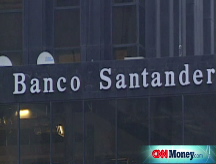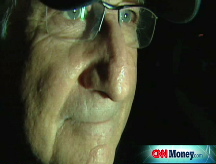Big banks hit by the Madoff mess
Wells Fargo and Banco Santander have come clean on their exposure to the alleged fraud. But that doesn't mean the headaches are over for other banks.
NEW YORK (CNNMoney.com) -- As the Bernard Madoff scandal continues to play out, it is becoming increasingly clear how devastating the alleged fraud has been for the banking industry.
It has already been well documented just how much damage the supposed Ponzi scheme has had on individual investors, charities and hedge funds. Now, more and more banks are coming clean about their exposure to the $50 billion fraud.
Last week, Wells Fargo (WFC, Fortune 500) said it took a nearly $300 million charge during the fourth quarter against loans held by customers who had invested with Madoff. And The New York Times reported that JPMorgan Chase (JPM, Fortune 500) is now facing scrutiny from European investors who lost money on notes issued by the bank that were linked to the performance of Madoff-related funds.
Fearing a backlash among its clients, Banco Santander (STD), one of the hardest hit financial institutions by the Madoff scandal, even offered a settlement to its private-banking customers last month after investing $3 billion worth of those clients' funds with Madoff through its Optimal Investment Services unit.
Some investors, however, have argued that the offer from the Spanish banking giant isn't enough, and are now pursuing legal action against the company. Last week, a class action lawsuit was filed against the bank in the United States District Court for the Southern District of Florida.
Deep-pocketed institutions, including banks such as Santander and audit firms, are quickly coming under the microscope as investors scramble to recover any remaining assets.
It may be one thing if an investor asked his bank to invest in Madoff. But banks that pushed clients to invest with Madoff or aggressively marketed funds that fed into Madoff's operation could be a bit more vulnerable to legal action, notes Tish McDonald, a partner at the law firm King & Spalding, whose practice focuses on litigation involving financial institutions.
"The language of the various customer agreements is going to be important since those agreements define what the bank agreed to do and what the customer agreed to do," said McDonald. "It is arguably unfair to hold a bank liable for doing what the customer directed the bank to do."
But even those companies that simply served as a depository institution for Madoff's operations could face legal challenges for failing to recognize that one of their account holders may be involved in some inappropriate business transactions.
Banks have been under greater pressure in recent years to do a better job of spotting any suspicious financial activity.
Still, that may be hard to prove, warned Robb Evans, whose firm, Robb Evans & Associates, has served as a receiver in dozens of Ponzi schemes. Most banks, he noted, have done a pretty good job keeping up with regulatory requirements.
"You can't expect banks to invade the privacy rights of every depositor," he said. "Banks should be in good shape provided they had compliance programs all along."
After the Madoff scandal first broke in December, most financial institutions that were affected were quick to disclose their exposure to the alleged Ponzi scheme.
The Royal Bank of Scotland (RBS) and French-bank BNP Paribas have each said they believe their individual exposure to Madoff's firm through trading and collateralized lending was in the neighborhood of $500 million each.
For others, the figure has been sharply higher. London-based HSBC (HBC) has estimated its exposure is close to $1 billion.
But some domestic institutions have remained relatively mum about the scandal, including Morgan Stanley (MS, Fortune 500) and Citigroup (C, Fortune 500).
Last month, it was reported that both New York banks had nearly $2 billion in client funds invested in Union Bancaire Privee, a fund which has invested with Madoff. A person close to the matter told CNN that Citigroup and its Smith Barney brokerage unit had no direct exposure to Madoff, but that three of their fund of funds had between 5% and 7% exposure.
And following the release of a list of the thousands of victims in the alleged fraud late Wednesday, more big Madoff bombshells seem unlikely, notes Gerard Cassidy, managing director of bank equity research at RBC Capital Markets.
If other banks had exposure to Madoff, chances are they probably already confessed to it during their most recent quarterly reporting period, he said.
However, Cassidy notes that it is possible more banks could charge off loans that were made to Madoff clients who lost much of their net worth and cannot keep up with their existing loan obligations, as was the case with Wells Fargo. But, he warned, it could be a quarter or two before such charges come to light.
Still, there are those who argue that the fallout from Madoff may not be all bad for banking industry.
Spooked by the scandal and broader selloff across financial markets, investors may be more willing nowadays to settle for a much lower rate of return in exchange for the safety offered by a simple bank savings account.
"Suddenly, putting money in a staid old savings accounts looks rational," said Seth Taube, a partner at the law firm Baker Botts and a former branch chief of enforcement at the Northeast regional office at the Securities and Exchange Commission.
That could be encouraging news for banks, which are desperately fighting for deposits in order to maintain their liquidity.
"The banks should give Madoff a medal," he added. "He made banks safe for smart people again." ![]()



